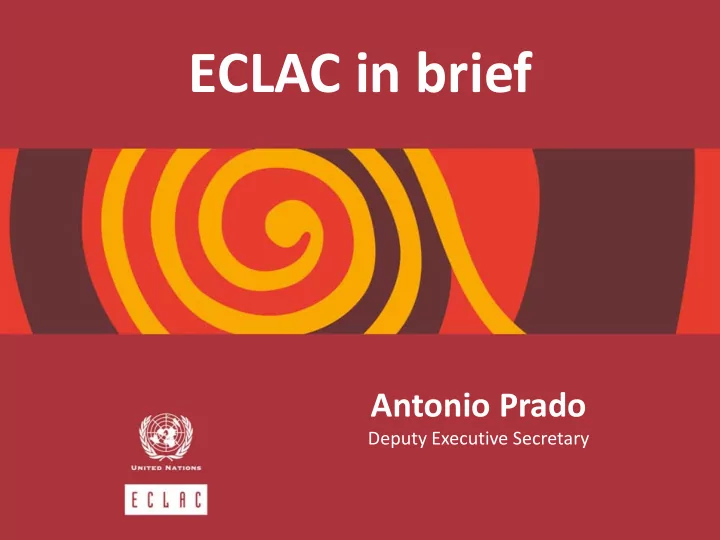

ECLAC in brief Antonio Prado Deputy Executive Secretary
ECLAC and its mission Founded in 1948 45 Member States and 12 Associate 2 subregional offices 4 national offices 1 liaison office “To function as a centre of excellence charged with collaborating with member States in a comprehensive analysis of development process geared to the design, monitoring and evaluation of public policies and the resulting provision of operational services in the field of specialized information, technical cooperation services, training and support for regional and international cooperation and coordination.” ECLAC in brief Antonio Prado
Multilateral stakeholders Global sphere United Nations System General ECOSOC Assembly Regional Inter-American Coordination system: Mechanism OAS/ECLAC/IDB tripartite committee Collaboration with ECLAC other agencies in the United Nations system Regional sphere Member Cooperation States partners National sphere United Nations Development Group – Latin America and the Caribbean UNDP ECLAC in brief Antonio Prado
Main counterparts • Latin American and Caribbean member States • Extraregional States (including development partners) • Regional and subregional organizations • Other bodies in the United Nations system • Academic institutions • Private sector • Civil society organizations ECLAC in brief Antonio Prado
What do we do? Regional forums Research, analysis and Linkage with technical assistance the global agenda • Source of comparable • Monitoring • Multisectoral forum for statistics and indicators implementation of the dialogue and cooperation 2030 Agenda for • Research and technical • Regional reports Sustainable Development, advisory services • Sharing experiences and including the Sustainable • Capacity-building and best practices Development Goals, and of strengthening • Inter-agency cooperation the Addis Ababa Action • Cooperation and (Regional Coordination Agenda technical support Mechanism) • Monitoring regional • Economic, social and implementation of the environmental Rio+20 agreements observatory (flagships) • Follow-up of international conferences ECLAC in brief Antonio Prado
The biennium 2014-2015 in numbers Research and dissemination Training courses, Inter- Technical of knowledge Expert group workshops and governmental cooperation meetings seminars meetings missions 90 Over 250 73 20 798* publications and technical documents * As at 19 October 2015 ECLAC in brief Antonio Prado
Flagships Foreign Direct Economic Latin Social Preliminary Statistical Investment in Survey of America Panorama Overview Yearbook for Latin America Latin and the of Latin of the Latin and the America Caribbean America Economies America Caribbean and the in the World of Latin and the Caribbean Economy America Caribbean and the Caribbean CEPAL Review Other selected publications ECLAC/ Oxfam Spanish ECLAC English ECLAC in brief Antonio Prado
ECLAC in the media Around 5.4 million visits to the ECLAC website More than 8,600 references in the mass media 608 journalists attended the press conferences to launch annual reports and other events 191 exclusive interviews given As of December 2015 225,000 followers on Twitter 222,098 fans on Facebook 506,905 views of ECLAC videos on YouTube 1,309,932 visits to Flickr ECLAC in brief Antonio Prado
Paths towards equality for Latin America and the Caribbean Time for Equality: Closing Gaps, Opening Trails Brasilia, 2010 Structural Change for Equality: An Integrated Approach to Development Compacts for San Salvador, 2012 Equality: Towards a Sustainable Future Lima, 2014 Horizons 2030: Equality at the Centre of Sustainable Development Mexico City, 2016 ECLAC in brief Antonio Prado
ECLAC proposal New institutions and public-private partnerships At the global level At the regional level At the national level Governance for creating Consolidating the Environmental big push global public goods regional contribution Progressive structural change based on an environmental big push Keynesian efficiency Environmental efficiency Schumpeterian Expansion of aggregate Economic growth and efficiency demand and active well-being with falling Innovation- and learning- fiscal policy CO 2 emissions intensive sectors ECLAC in brief Antonio Prado
Implementation of the 2030 Agenda Strengthen the regional architecture for implementation and follow-up of the 2030 Agenda for Sustainable Development Support integration of the SDGs in national and subnational development plans Build capacities relating to data and statistics for measuring the SDGs Strengthen implementation mechanisms at the regional level through a renewed equation between the State, the market and society ECLAC in brief Antonio Prado
Recommend
More recommend